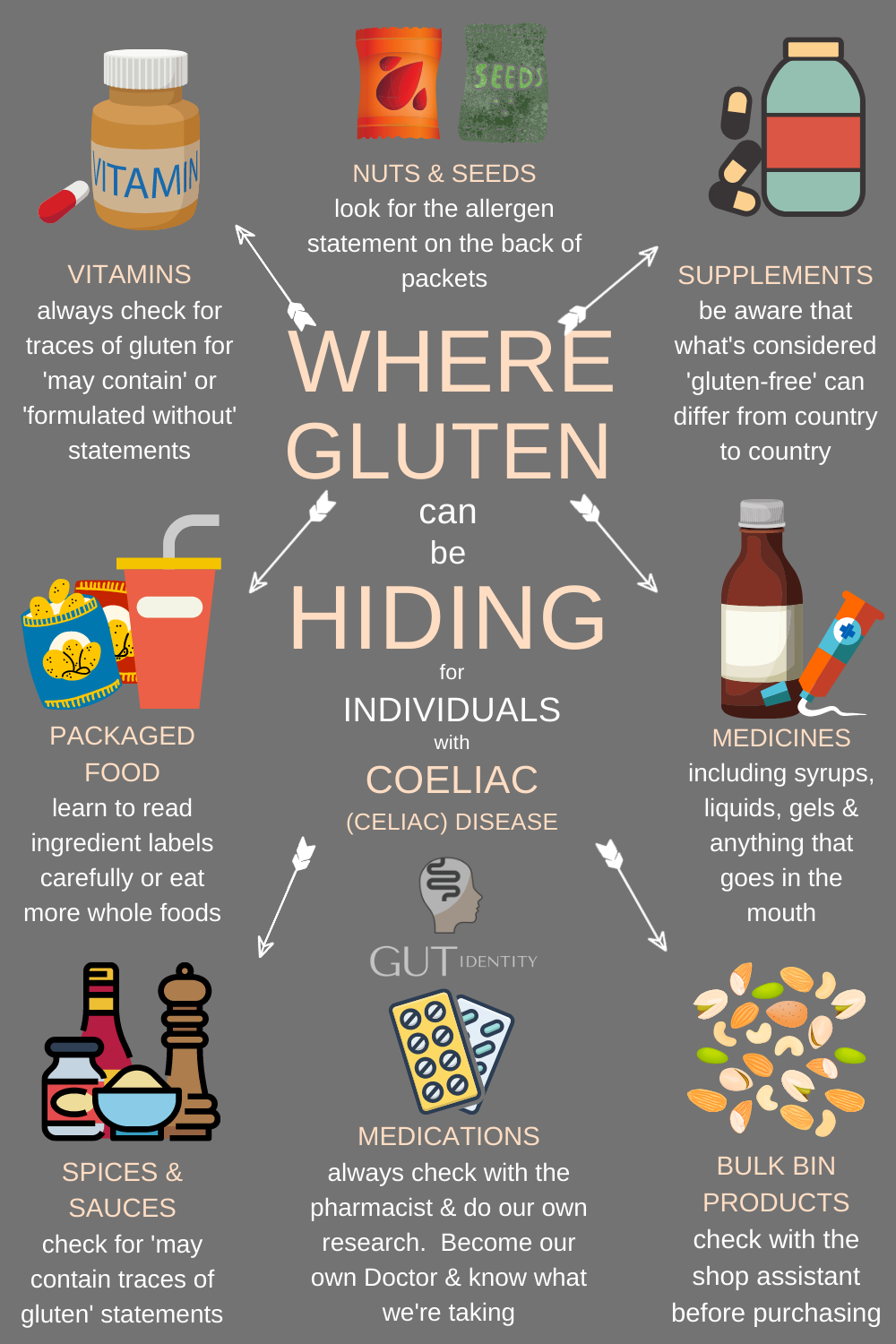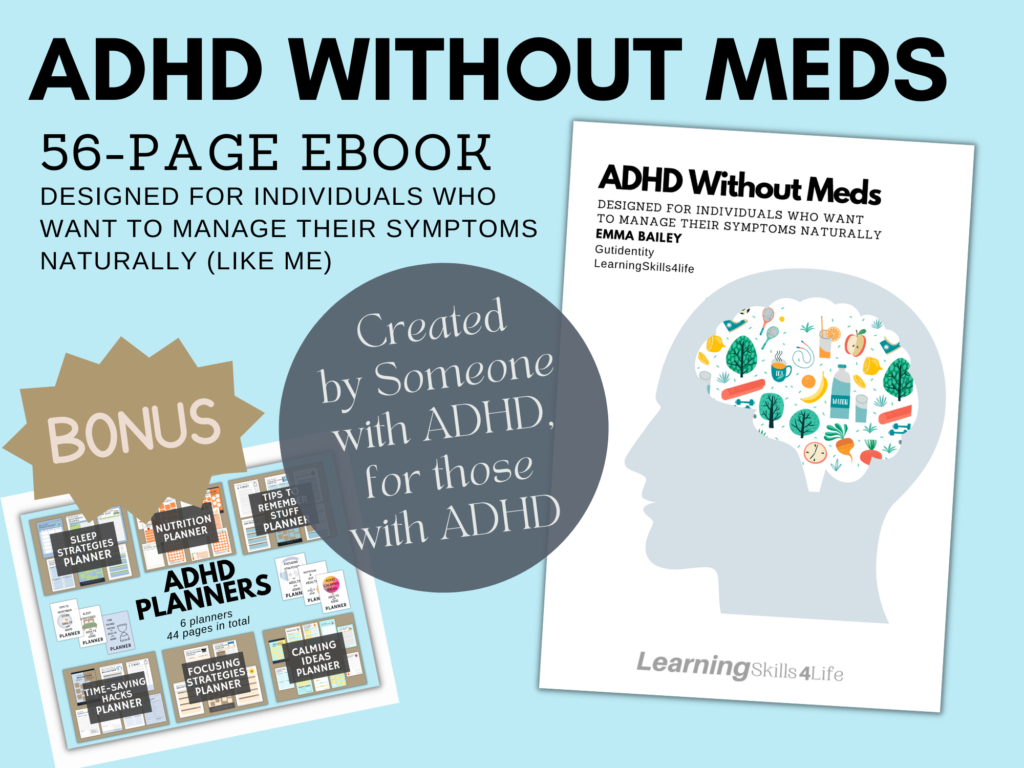Gluten in ADHD medication poses a risk to anyone with a dual diagnosis of Attention Deficit Hyperactivity Disorder (ADHD) and Coeliac Disease (CD). As research continues to grow on how the gut influences the brain, connections are also beginning to form, on the relationship between CD and ADHD.
But what could be so difficult in finding out whether certain medications for ADHD contain gluten? And, why this ‘situation’ led me to ask ONE IMPORTANT QUESTION- ‘Does MY ADHD medication contain gluten?’.
Establishing an answer to this question is not straightforward for several reasons. Issues around the inactive ingredients ‘starch’ or ‘wheat starch’, lengthy and incomplete Consumer Medicine Information (CMI) leaflets, how this information is presented and understood by the consumer, and differences in global pharmaceutical labelling regulations, all add to the confusion.

ADHD medication, gluten, AND COELIAC DISEASE
For many years now, stimulant medication is considered a first-line treatment for ADHD. But, as more studies surface on a possible connection between ADHD and CD, more research is needed on the ingredients in ADHD medication and its effect on the gut.
As an individual with both ADHD and CD, I’ve had a personal interest in this topic because the brand of stimulant medication I used before being diagnosed with CD, contained gluten.
This particular stimulant is used globally but may be far from suitable for those diagnosed with both ADHD and CD. My ADHD meds contained the protein ‘gluten’ from the inactive ingredient ‘wheat starch’. Whether it’s safe for anyone with existing gastrointestinal problems, sensitivity to gluten or wheat, or even individuals carrying the gene variants associated with CD, is still unknown.
But, for individuals with a diagnosis of CD, the ingredient ‘wheat starch’, is not considered safe in any amount. This then raises a serious question as to why it’s labelled as ‘containing gluten’ in some countries but just ‘starch’ in others. Given that global rates of ADHD and CD continue to climb, it seems pertinent that this question be raised and hopefully, answered.
Similar articles on ADHD, gluten and Coeliac Disease
Is ADHD and Coeliac Disease Connected?
Is Gut Dysbiosis Related to ADHD?
Can too much Gluten Lead to Autoimmune Disease?
Check out the clip below to see what symptoms are associated with CD.
COELIAC DISEASE AND AVOIDING GLUTEN
One of the most difficult, and ongoing challenges of CD, is the absolute necessity to avoid consuming products containing gluten.
For anyone with CD, ensuring that even traces of gluten are not in vitamins, supplements and more importantly, medications are an absolute must.
“What a lot of people don’t realise, the smallest trace of gluten can spark an inappropriate immune response in the body, resulting in damage to the small intestine. This damage causes a multitude of symptoms affecting the entire body, including the brain.“
Unless you have CD, or are caring for or living with someone who does, it’s surprising how many products may contain gluten, and finding accurate and current information can be complicated, conflicting and confusing. A lot of confusion stems from the differences in pharmaceutical labelling regulations across countries.
TO LABEL IT ‘STARCH’ OR ‘WHEAT STARCH’? THAT IS THE QUESTION
One of the most confusing aspects around the inactive ingredients in ADHD medication is the inconsistent terminology used in the CMI leaflets.
Whether an ingredient is labelled as ‘starch’ or ‘wheat starch’ (containing gluten), varies across countries. But when listed as just ‘starch’, establishing its source and if it’s free from gluten, can be difficult.
Additionally, it’s the consumer’s responsibility, to not take their ADHD medication if they’re allergic or sensitive to any of the ingredients listed. But how many consumers would know of a possible allergy, if they don’t know where the ‘starch’ is derived from?
VARIATIONS IN CONSUMER MEDICINE INFORMATION (CMI) LEAFLETS

Concerns over variations in CMI leaflets have also been raised by health care professionals. Unfortunately, the majority of reviews and articles in this area are available for purchase only. Please see the links at the bottom of this post for further information on where they can be purchased.
Finding clear and current information, on whether ADHD medication contains gluten, can be confusing. CMI leaflets are provided to consumers, but they vary.
Many contain blanket statements “that they do not contain all of the available information”. Responsibility is put on the consumer to seek more information if needed. But you’ve got to know what you’re ACTUALLY looking for in the first place!
There is a multitude of CMI leaflets from various countries available online and can be accessed by the general public. These include countries like Australia, New Zealand, the United Kingdom, Israel and the United States, to name a few.
Some CMIs clearly state if a medication contains ‘wheat starch’, but the wording around whether it’s safe for someone with CD can be unclear.

Every other possible issue is often listed
It’s worth noting, almost every possible side-effect is often listed in these CMI leaflets. Additionally, warnings around drug abuse and dependence are thoroughly covered, and item after item is listed as possible adverse reactions.
But despite the extensive amount of information packed into these documents, it does seem unusual as to why it’s so difficult to state where the ingredient ‘starch’ has been derived from. And, if there’s no gluten present, why is it so difficult to label medications ‘gluten-free’ providing there is no detectable gluten found?
Because of the differences in global pharmaceutical labelling of medications, it’s imperative that consumers develop awareness around the active and inactive ingredients, and seek further information if needed.
AWARENESS OF gluten IN ADHD MEDICATION

Awareness of the ingredients in ADHD medications, is scarily limited. When first diagnosed with CD, I had to seek information on my medications through multiple sources. These were the steps I took:
STEPS TO IDENTIFY POSSIBLE GLUTEN
1. Sought help from a licensed medical professional to get the most up to date CMI leaflet on my medication.
2. Visited the company’s website from the address on the box to check the ingredients.
3. Read the CMI leaflet carefully to find where the ingredients were listed.
4. Contacted specialists about my concerns over the ingredient ‘wheat starch’.
5. Got advice from the pharmacist over the cost of compounding my medication (formulating it without gluten or lactose).
6. Discussed any concerns with a licensed medical practitioner about gastrointestinal problems.
7. Researched current information about CD and the advice given on medications and gluten.
8. Conducted further research on the topic which resulted in me writing this article.
Due to the ingredient ‘wheat starch’, my prescription is now compounded at a whopping 8 times the price of the original prescription.
But what concerns me more than the price hike, is the lack of awareness that this medication contained gluten. What could this mean for children and adults, who may have undiagnosed CD or gastrointestinal problems, currently taking medication for ADHD but are unaware of the ingredients?
Where Gluten can be hiding

WHAT COULD Cause A LACK OF AWARENESS OF GLUTEN IN ADHD MEDICATION?

Based on personal experience and that of a former Special Education Teacher, many reasons could contribute to a lack of awareness.
1. Often the ingredients ARE NOT listed on the medication packaging so the consumer must refer to the CMI leaflet or download it from the Company or Internet. Finding a current one is difficult.
2. CMI leaflets can be incomplete. A large majority seem to have a convenient ‘this leaflet doesn’t contain all the information’ type disclaimer in the first sentence or paragraph.
3. CMI leaflets are often presented in a lengthy, multiple page document, in small print.
4. The warning about ingredients is often in the middle or at the end of the document making it less obvious.
5. The amount of text could be overwhelming and difficult to read. Considering the genetic basis of ADHD, and it’s relationship to a range of learning difficulties, the likelihood of a parent having similar difficulties, rises. Reading difficulties and ADHD go hand in hand!
6. It’s left up to the consumer to let their Doctor know of any food intolerances or sensitivity to gluten.
7. Many consumers may not have an awareness of what an ‘intolerance to gluten’ is.
8. Knowing exactly where gluten can be found in food, drinks, supplements, vitamins or medications, is quite a complicated process which can require a fair amount of research and, knowledge of ‘where to look’.
9. Being able to effectively read ingredient labels and have knowledge of what foods can cause intolerance, usually requires the support of a Dietitian or Nutritionist which can be costly.
10. It’s now understood that some individuals with CD don’t display obvious symptoms or show any symptoms at all. CD might not have even been considered when an ADHD diagnosis was given, or when a medication was first prescribed.
CONNECTION BETWEEN ADHD AND GASTROINTESTINAL PROBLEMS

Over the 20 years I spent as a Special Education Teacher, I’ve encountered so many children diagnosed with ADHD, who had similar gastrointestinal problems.
Many parents of children with ADHD, do their very best to provide their children with a gluten-free diet, hoping to reduce ADHD symptoms. But this effort could be undermined if parents are unaware of the ingredients in ADHD medications, which could result in a low, but continual dose of gluten. While this may not be of immediate concern for those who don’t have CD, given the growing connection between CD and ADHD, it’s something that requires further investigation.
While some ADHD medication might only contain a very small amount of gluten, ongoing and continual exposure to gluten could contribute to gastrointestinal problems. It could also exacerbate undiagnosed CD, or continue to damage the small intestine in those with CD who are unaware their ADHD medication contains gluten.
While medication may help relieve ADHD symptoms, the ingredients may also be silently creating a much bigger problem. When looking back at early research on stimulant medication use, an extremely dated 1990 study (American Academy of Pediatrics) revealed some interesting findings on the side-effects from Methylphenidate (active ingredient) use in children.
“Parent ratings indicated that only the side effects of decreased appetite, insomnia, stomach aches, and headaches increased significantly in frequency and severity during the two active medication doses as compared with the placebo condition.”
Although the findings state that “fewer than half of the children experienced these side-effects”, and they were considered mild, how would this stack up to current figures on ADHD medication use, and other gastrointestinal problems.
Other groups of individuals with gastrointestinal problems
Groups of individuals with gastrointestinal problems, that we just didn’t hear of years ago, are also increasing.
· Food Intolerance (resulting in the need to go on the Low FODMAP Diet)
· Gluten Intolerant
· Non-Coeliac Gluten Sensitivity (NCGS)
· Wheat Allergy
· Irritable Bowel Syndrome (IBS)
· Inflammatory Bowel Disease (IBD)
In a comprehensive 2017 review, examining gastrointestinal side-effects and Methylphenidate use, Methylphenidate use was found to increase the risk of abdominal pain. So where does all of this leave consumers with gastrointestinal problems relating to gluten and ADHD?
WHERE TO FROM HERE?

More current research is needed on the relationship between ADHD medication and CD and establishing exact numbers of individuals who have a combined diagnosis of ADHD and CD.
CMI leaflets need to be evaluated on how information is presented and on consumer awareness around the ingredients in ADHD medications. Evaluation of reading comprehension concerning CMI leaflets would also be interesting to see. How many people, read these thoroughly?
Additionally, standardising the labelling of ingredients in pharmaceuticals could help minimise confusion and help consumers determine if their medication contains gluten.
It’s highly important to seek medical advice from your prescribing Doctor or Specialist immediately over any concerns regarding medication. Do not stop taking your medication. Your medication may be different from the medication discussed in this article.
CAUTION
NEVER STOP TAKING A PRESCRIBED MEDICATION WITHOUT FIRST CONSULTING A MEDICAL PRACTITIONER OR PROFESSIONAL.
It’s dangerous, could put your health or the health of a loved one in jeopardy, and is just plain stupid. So seek advice now if you’re concerned.
This article was written based on the author’s personal experience with ADHD medication and Coeliac Disease. The information mentioned in this article is NOT a substitute for professional medical advice.
ADHD without Meds
I’ve written an eBook based on the strategies which is now available through my Etsy store. It covers 10 main points based on the strategies I now use and is broken down so it’s not too overwhelming – well at least that’s the goal.
So if you’re interested in finding out what I do and how I live my life now without medication, check it out on Etsy by following the link below by clicking on the image – it will take you straight to my shop!
Disclaimer: I am not a Doctor and I went off my medication under the supervision of a Doctor, Psychiatrist, Psychologist and nutritionist. ALWAYS seek medical advice BEFORE making ANY changes to your medication or lifestyle
ORIGINAL SOURCES AND FURTHER INFORMATION
Attention Deficit Hyperactivity Disorder (ADHD) Treatment & Management
https://emedicine.medscape.com/article/
Paediatric Integrative Medicine Approaches to Attention Deficit Hyperactivity Disorder (ADHD)
https://www.ncbi.nlm.nih.gov/pmc/
articles/PMC4928725/pdf/children-01-00186.pdf
Comparative efficacy and tolerability of medications for attention-deficit hyperactivity disorder in children, adolescents, and adults: a systematic review and network meta-analysis
https://www.thelancet.com/action/
showPdf?pii=S2215-0366%2818%2930269-4
Side Effects of Methylphenidate in Children With Attention Deficit Hyperactivity Disorder: A Systemic, Placebo-Controlled Evaluation
https://pediatrics.aappublications.org/
Gastrointestinal adverse events during methylphenidate treatment of children and adolescents with attention deficit hyperactivity disorder: A systematic review with meta-analysis and Trial Sequential Analysis of randomised clinical trials
https://journals.plos.org/plosone/article?
ARTICLES FOR PURCHASE
Comparison of International Regulations for Written Medicine Information (WMI) on Prescription Medicines
article/10.1177/2168479018776949
Regulatory agencies’ recommendations for medicine information leaflets: Are they in line with research findings?
https://www.sciencedirect.com/science
/article/abs/pii/S1551741117301158
The comorbidity of learning difficulties and ADHD symptoms in primary-school-age children.






Ƭһanks for sharing y᧐ur info. I reallү appreciate youг efforts and I ԝill be waiting for your furtһer post thank you oncе again.
thanks, I appreciate your feedback. Glad you enjoy the posts
My 16 year old daughter has Celiac and ADHD, is there any safe drug to give her?
Hi. Thanks for reaching out. I’m not a doctor so can’t suggest any medication. I don’t take medication for my ADHD now due to CD so I use environmental and lifestyle strategies to help manage my symptoms. I felt like the medication hurt my gut and I didn’t want to cause any further damage. Possibly see a functional medicine doctor and a nutritionist as they will be able to help you with environmental changes that may help.
Hey! I am also fellow ADHD + Celiac person too. I have struggled over years finding a medication that doesn’t make me sick in small doses that build up (possibly cross contamination), or large doses. Last medication I tried was Dexedrine. I used to take. I tried a few other ones like Vyvanse, Adderall, and Concerta before. Please email me which one you found to be safe. I have been off meds for months now due to being afraid of symptoms from gluten.
Hi
Thanks for reaching out. I used to take the long-acting Ritalin LA 10mg Capsule plus got the short-acting Ritain capsule specially compounded without the gluten. The compounded formula was an incredible 9 x the cost. I no longer take any medication for my ADHD as it was hurting my gut and making me feel sick so I’ve gone as natural as possible. I feel better off it but have to do so many lifestyle changes to keep on top of things. I also need to be very consistent with these lifestyle changes for them to continue to work for me. Hope that helps. Read my other posts on both conditions as you may find something in there that may help as well. I’ll also be adding to the posts every now and again.
Thanks
Emma